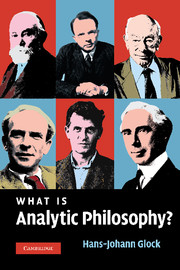3 - Geography and language
Published online by Cambridge University Press: 05 June 2012
Summary
This chapter discusses geo-linguistic conceptions of analytic philosophy. Section 1 presents the Anglocentric version of such a conception, which arose in conjunction with the analytic/continental contrast. Section 2 rejects the Anglocentric conception by reference to the Germanophone roots of analytic philosophy. Section 3 discusses a possible comeback, namely that the Germanophone pioneers of analytic philosophy were aberrations in a philosophical culture that was generally hostile to the analytic spirit. Section 4 turns to a modification of the Anglocentric conception. According to the ‘Neurath-Haller thesis’ analytic philosophy, though not simply Anglo-Saxon, is at any rate Anglo-Austrian in origin and character. While both suggestions contain kernels of truth, they distort the complex roots of analytic philosophy, especially the impact of German thinkers and of Kantian ideas. The final section argues that any geo-linguistic conception falls foul of both historical facts and the status quo. The dichotomy between analytic and continental philosophy is not just a cross-classification, it also fails to exhaust the options, since it ignores pragmatism and traditionalist philosophy. The real philosophical divisions cut across all geographical and linguistic borders.
FOG OVER CHANNEL – CONTINENT CUT OFF!
In so far as analytic philosophy is contrasted with continental philosophy, it is natural and indeed common to conceive of it in geographic terms. Strictly speaking, these terms are geo-linguistic. On the one side, we find analytic philosophy which is referred to as (in decreasingly parochial terms) ‘British’, ‘American’, ‘Anglo-Saxon’, ‘Anglo-American’ or ‘Anglophone’.
- Type
- Chapter
- Information
- What is Analytic Philosophy? , pp. 61 - 88Publisher: Cambridge University PressPrint publication year: 2008



